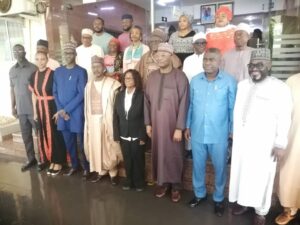By: Goodluck E. Adubazi, Abuja.
The Independent National Electoral Commission (INEC) on Monday welcomed a delegation from the Economic Community of West African States (ECOWAS) as part of a follow-up mission to assess the implementation of recommendations from the 2023 general elections.
INEC Chairman, Prof. Mahmood Yakubu, received the delegation at the Commission’s headquarters in Abuja. The visiting team, representing the ECOWAS Network of Electoral Commissions (ECONEC), is tasked with evaluating Nigeria’s progress on the 37 recommendations made by the ECOWAS Election Observation Mission following the 2023 polls.
Prominent among the visitors were the Chairperson of the National Elections Commission of Liberia, Mrs. Davida Browne Lansanah, who leads the mission, and the Vice Chairman for Corporate Services of the Electoral Commission of Ghana, Dr. Bossman Eric Asare. Also in attendance was Mr. Serigne Mamadou Ka, Acting Permanent Secretary of ECONEC and Head of the Electoral Assistance Division of ECOWAS.

Prof. Yakubu commended ECOWAS for its continued engagement in democratic processes across the region, including its policy of deploying post-election follow-up missions. “Nigeria has participated in similar missions, such as the one to the Republic of The Gambia in April this year,” he noted. “Today, it is our turn to host our colleagues from Liberia and Ghana.”
According to Yakubu, the 2023 ECOWAS mission issued 37 recommendations targeting seven key stakeholders in Nigeria’s electoral process. Of those, 13 were directed at INEC, while the remaining 24 involved other bodies including the National Assembly, the Nigeria Police Force, the National Broadcasting Commission (NBC), the National Information Technology Development Agency (NITDA), civil society groups, political parties under the Inter-Party Advisory Council (IPAC), and the Nigeria Union of Journalists (NUJ).
He revealed that INEC has addressed all the recommendations requiring administrative action and is awaiting legislative review for those needing parliamentary intervention. “A detailed response has been prepared, with most issues also captured in our 142-point electoral reform document, developed after extensive stakeholder consultations,” he said.
These reports, along with the comprehensive review of the 2023 general elections, have been published on the INEC website and distributed in print to the ECOWAS delegation.
Prof. Yakubu concluded by expressing gratitude to the Nigerian government for supporting the mission and acknowledged the participation of development partners, including Lenny Tabu of the Electoral Institute for Sustainable Democracy in Africa (EISA), Emmanuel Kisi of the Institute for Democracy and Electoral Assistance (IDEA), and Michael Agada from the German International Cooperation Agency (GIZ).
“This mission is part of the cycle of democratic accountability in West Africa. What goes around comes around,” he said. “We welcome this opportunity for review and peer learning.”
Standard Times Nigeria Newspaper reports that the ECONEC team was in Nigeria to begin a post-election follow-up and needs assessment mission, aimed at reviewing the implementation of recommendations made after the country’s 2023 general elections.
Speaking during the official engagement with the Independent National Electoral Commission (INEC) in Abuja, the head of the mission and Chairperson of the National Elections Commission of Liberia, Mrs. Davida Browne Lansanah, emphasized the peer-review nature of the mission.
“This visit is not only about following up on the 2023 general elections, but more importantly, about assessing how the recommendations we made have been acted upon,” she stated. “We are here to engage with INEC, to understand how the Commission navigated the challenges that arose during the election, and to learn from their responses.”
Lansanah noted that while the mission focuses on Nigeria, the broader goal is to generate shared lessons for electoral commissions across the West African sub-region. “The issues faced by one election management body are often shared across our institutions. By reflecting together on challenges and how they were addressed, we strengthen the collective capacity of our electoral systems,” she added.
The Liberian elections chief said the mission also serves as a learning opportunity for ECONEC members, helping each country improve its own electoral processes. “We see this as an exercise in mutual growth—what we learn here can be applied to improve elections back home,” she said.
On behalf of the delegation, she expressed appreciation to INEC and the Nigerian authorities for their warm hospitality and collaboration. “We are always warmly welcomed in Nigeria, and we sincerely appreciate INEC’s commitment to this process. Liberia’s National Elections Commission, in particular, appreciates the efforts and dedication demonstrated by INEC,” she concluded.
The ECONEC mission will hold consultations with key stakeholders in Nigeria’s electoral process during its stay, including government agencies, civil society, and political party representatives. The team is expected to submit a report summarizing their findings and outlining further recommendations for electoral reform and institutional strengthening.